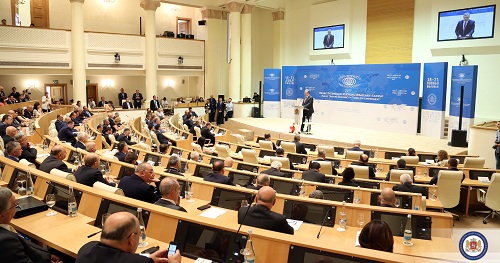
Giorgi Kvirikashvili addressing the Ambassadorial, July 18, 2017. Photo: MFA Georgia
Addressing the annual gathering of Georgian ambassadors on July 18, Prime Minister Giorgi Kvirikashvili, President Giorgi Margvelashvili, Parliamentary Chairman Irakli Kobakhidze and Foreign Minister Mikheil Janelidze summed up Georgia’s diplomatic achievements since the last ambassadorial and spoke on the country’s foreign policy priorities.
“Contemporary international environment is complex and rapidly changing,” Foreign Minister Mikheil Janelidze said in his welcoming remarks to the ambassadors. “The growing influence of regional powers over the issues of international politics is becoming more and more noticeable; populist tendencies have considerably increased, as well as the threats emanating from illegal migration and international terrorism; the role of soft power in international relations is continuously growing,” he added.
These challenges, Janelidze went on, “greatly influence the South Caucasus-Black Sea Region.” “The existence of unresolved and active conflicts in the region creates a threat that military means might be used for restoring and enlarging the spheres of influence,” Janelidze told the ambassadors.
Occupation/Relations with Russia
Kremlin’s policy towards Georgia and the occupation of Abkhazia and Tskhinvali regions were widely covered by the four speakers.
“The process of factual annexation of the Abkhazia and Tskhinvali regions by the Russian Federation represents the main challenge for Georgia’s external policy. The difficult security, humanitarian and human rights situation in the occupied territories is also the greatest challenge facing Georgia and regional stability as a whole,” Minister Janelidze said in his welcoming remarks.
President Giorgi Margvelashvili, who addressed the ambassadors after Janelidze, said that in the “battle” that Georgia had to pursue with respect to the non-recognition of Abkhazia and Tskhinvali Region/South Ossetia, Georgian diplomats “scored a clear victory” against “one of the world’s most powerful and experienced forces – the Russian diplomacy.”
According to President Margvelashvili, the Russian Federation’s “constant efforts to create difficulties for Georgia, worsen the security environment in the region.” “We need to better clarify it to our partners that the confrontation with the Russian Federation has not started in 2008 and that it traces back to 1990s, when Georgia was taking its first steps to independence and free choice,” Margvelashvili told the ambassadors.
Despite these difficulties, Margvelashvili added, Georgia made “two very important strategic choices: strategic patience, which will lead us peacefully to sovereignty and restoration of territorial integrity; and second, that we will not allow that these difficulties will in some way affect Georgia’s further development.”
Prime Minister Giorgi Kvirikashvili spoke on the two regions as well, saying that “the occupation of 20% of the country’s territory remains one of the biggest challenges to the development of Georgia.”
“Unfortunately, the situation in the occupied territories is still very grave: the Russian Federation continues illegal installation of barbed wires and banners. It is clear that every single step that we take towards the West is met with such aggressive moves,” he added.
PM Kvirikashvili also noted that “thanks to the efforts of the Georgian diplomacy,” the issue of occupation “is actively present on the international agenda.”
Parliamentary Chairman Irakli Kobakhidze touched upon the matter as well, saying that the problem could only be solved with the support of the international community and partner countries.
“Only with the support of the international community and through deepening relations with partner states we can deter aggression against our country, put an end to occupation of our territories and to the creeping annexation of our country, restore territorial integrity and secure its place among the world’s most successful and democratic countries,” Kobakhidze stated.
European, Euro-Atlantic Integration
In his welcoming remarks, Foreign Minister Janelidze put particular emphasis on the visa liberalization with Schengen countries, noting that “this great achievement” will “lead Georgia to its eventual goal of full EU membership,” for which the Georgian Government has an ambitious action plan.
Mikheil Janelidze spoke on NATO-Georgia relations as well, saying that the country “enjoys strong political and practical support from the Alliance.”
Parliamentary Chairman Irakli Kobakhidze touched upon the matter as well, saying that “the future of Georgia is in the European and Euro-Atlantic integration.” “The key objective of our foreign policy is to ensure Georgia’s security and development through protecting and maintaining the sovereignty and territorial integrity of our country, as well as its western course and democratic values chosen by Georgian people,” Kobakhidze noted.
PM Giorgi Kvirikashvili said in his speech that the past year has made it more clear “that Georgia’s European path has no alternatives.” The Prime Minister also noted that the course is supported by majority of Georgians and therefore, “further progress, along with being the priority of our government, is the fulfilment of the wishes of our society.”
Kvirikashvili also said “the transitional period” after the presidential elections in the United States, went very “productively” thanks to the country’s diplomatic efforts. “Vice President Mike Pence’s upcoming visit to Georgia will further contribute to deepening the [Georgia-U.S.] relations,” he added.
Regional Cooperation
The speakers touched upon regional cooperation as well, with President Giorgi Margvelashvili highlighting Georgia’s role as a country striving for “good-neighborly relations” with all of its neighbors.
“Georgia is the country and the state that makes serious investments in its function to be a place connecting European and Asian markets, a state the participation and support of which helps solve many economic and energy problems,” Margvelashvili stated.
Georgia’s transit function was also raised by Minister Janelidze, who said that the South Caucasus, “stemming from its geopolitical location, is an important commercial and transit corridor creating good prospects for the sustainable economic development of countries in the region.”